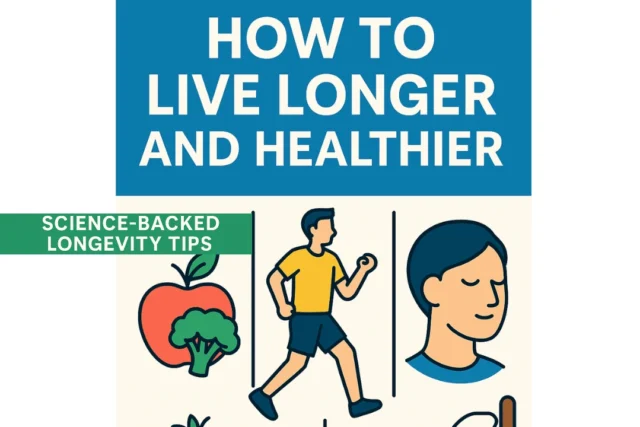Contents
How to Live Longer and Healthier: Practical Tips Backed by Science
Longevity is more than the number of years you live — it’s about the health, function, and joy you have throughout those years. While genetics play a role, lifestyle choices determine much of how long and how well we live. The tips below combine common-sense advice with findings from longevity research to help you make practical, sustainable changes starting today.
1. Maintain a Balanced Diet
Good nutrition is the cornerstone of long-term health. Prioritize whole, minimally processed foods: vegetables, fruits, legumes, whole grains, healthy fats (olive oil, nuts), and lean proteins such as fish and poultry. Limit added sugars, processed meats, and refined carbohydrates. Research from Blue Zones — regions with high longevity — points to predominantly plant-forward diets with occasional fish and modest meat consumption. Small, sustainable swaps (water instead of sugary drinks, an extra serving of greens) add up over time and reduce chronic disease risk.
2. Stay Physically Active
Exercise strengthens the heart, muscles, and bones, improves mood, and supports immune function. Aim for at least 150 minutes of moderate-intensity activity (brisk walking, cycling) or 75 minutes of vigorous exercise weekly, plus two strength-training sessions. Include balance and flexibility exercises to lower fall risk as you age. You don’t need a gym membership — walking, gardening, cycling, and bodyweight routines are simple, effective, and sustainable. Consistency matters more than intensity for long-term benefits.
3. Prioritize Mental Health
Mental well-being is tightly linked to physical health. Chronic stress, social isolation, and untreated depression can increase inflammation and cardiovascular risk. Practice stress management techniques like mindfulness, meditation, or deep-breathing exercises. Maintain strong social ties — friendships, family, and community engagement are powerful predictors of longevity. If you struggle, seek professional help; therapy and, when appropriate, medication can significantly improve quality of life and survival.
4. Get Quality Sleep
Sleep allows the body to repair and the brain to consolidate memory. Adults typically need 7–9 hours per night. Keep a consistent sleep schedule, reduce screen time before bed, and create a cool, dark sleeping environment. Poor sleep patterns are linked to higher risks of obesity, diabetes, heart disease, and cognitive decline. Treat sleep as a priority — many health gains follow improved sleep habits.
5. Avoid Harmful Habits
Certain behaviors clearly shorten lifespan. Smoking remains a leading preventable cause of death — quitting at any age provides measurable benefits. Limit excessive alcohol intake and avoid recreational drug use. Minimize risky behaviors that cause injuries, and practice sun safety to lower skin cancer risk. Replace harmful routines with positive ones (e.g., a short walk instead of a smoking break) to compound health benefits over time.
6. Schedule Regular Health Check-Ups
Preventive care catches issues early when they are easiest to treat. Maintain annual check-ups, monitor blood pressure and cholesterol, screen for diabetes, and follow age-appropriate cancer screening guidelines. Keep vaccinations up to date. Be proactive with recommended tests and follow-up; early detection often leads to simpler treatment and better outcomes.
7. Keep Learning and Stay Curious
Cognitive engagement supports brain health. Reading, learning new skills, playing strategy games, or taking courses keeps neural pathways active and may lower the risk of cognitive decline. Social learning — joining clubs or group classes — provides mental stimulation plus social benefits, which together support longevity and overall wellbeing.
8. Live with Purpose
Having a sense of purpose provides motivation and contributes to better health. Whether it’s family, work, volunteering, creative pursuits, or spiritual practice, purpose-driven people tend to have lower stress and reduced rates of chronic disease. Identify activities that give meaning to your life and shape daily routines around them to boost resilience and life satisfaction.


